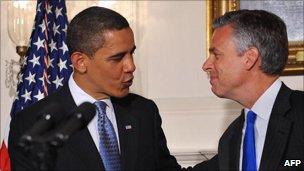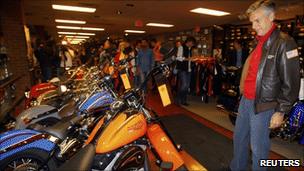Profile: Jon Huntsman
- Published

The perception that Mr Huntsman has been friendly with Mr Obama put off some Republicans
Jon Huntsman, the former governor of Utah, joined the race for the Republican presidential nomination with a distinct, if awkward, qualification: he worked for the other side.
As ambassador to China for two years under President Barack Obama, he had arguably the most foreign policy expertise of the Republican field.
But that experience was used against him by his rivals, who painted him as working with Mr Obama instead of working to oppose his policies and rebuild the Republican party at home.
He quickly became the darling of the media, with the story of his return from China to seek the nomination profiled in breathless prose in a series of lengthy newspaper and magazine profiles.
But many conservative commentators never warmed to Jon Huntsman as much as the mainstream media appeared to. His campaign won few major donations or endorsements, and failed to seize the news agenda in the way his rivals did.
After spending months campaigning almost exclusively in New Hampshire - a decision made partly, at least, because of a lack of cash - a third-place finish in that state's primary on January 10 undermined his ability to continue.
While Mr Huntsman claimed, initially at least, that he had a "ticket to ride" to South Carolina, his poll numbers continued to flounder as the Palmetto State primary approached, prompting his decision to end his bid.
Early speculation
Born in March 1960, Jon Huntsman Jr is the motorcycle-driving son of billionaire Jon Huntsman Sr, who founded a large chemical manufacturer.
He dropped out of high school to play keyboard in a rock band, later finishing school and graduating from the University of Pennsylvania. He also served as a Mormon missionary in Taiwan, and speaks fluent Mandarin - a skill he notably deployed in a Republican debate before the New Hampshire primary.
After university Mr Huntsman worked as an aide in President Ronald Reagan's White House, and, while still in his early 30s, President George H W Bush appointed him ambassador to Singapore.
Later he served as a trade official under President George W Bush, and ran the Huntsman family's holding company.
In 2004, he ran for governor of Utah promising to simplify the state's tax code, develop industry and reform the state's Mormon-inspired alcohol restrictions. He was elected governor with 58% of the vote.
After his re-election in 2008 with 78% of the vote, he began meeting national political consultants and his name began to surface in discussions about the Republican party's prospects for the 2012 race.

Mr Huntsman is known as an avid motorcycle enthusiast and rock musician
David Plouffe, who managed Mr Obama's 2008 presidential campaign, said Mr Huntsman was "the one person in that party who might be a potential presidential candidate".
In May 2009, Mr Obama nominated Mr Huntsman to be ambassador to China. Some analysts said the new president was trying to neutralise a potential political rival, but others said Mr Obama was being true to his campaign-trail calls for bipartisanship.
'Loyalty to country'
Towards the end of 2010, Mr Huntsman told Newsweek magazine he thought he and his family "may have one final run left in our bones", and a group of consultants and supporters back in the US sprang into action building a campaign.
Mr Huntsman returned from Beijing in April, and less then a month later began travelling to New Hampshire to gauge his appeal.
When pressed on his tenure under Mr Obama - his most immediate weakness - he has insisted he went out of loyalty to his country, not to a president or his policies.
"I did serve President Obama," he said in May 2011. "I served my president, my president asked me to serve, in a time of war, in a time of economic difficulty in this country. I'm the kind of person, when asked by my president to stand up and serve my country, when asked, I do it."
In a string of Republican debates during the run-up to the primary season, Mr Huntsman rarely stole centre-stage. But he made a strong defence of his decision to serve in debates ahead of the New Hampshire poll, despite strong attacks on his decision by front-runner Mitt Romney.
After spending some two years out of the US, Mr Huntsman missed the growth of the Tea Party movement and failed to win name-recognition among voters and donors.
His poll numbers bumped along the bottom of the pack, often at less than 2%, and the perception by many of him as a moderate favoured by a liberal media elite was seen to work against him.
He has also taken some positions seen as too moderate for the conservative voters influential in the Republican primary process. He supports civil unions for same-sex couples and believes in the science behind global climate change.
A summer 2011 tweet from his account seen as critical of climate change sceptics - he said he believed the scientists, adding: "Call me crazy!" - was interpreted as a slight on the voters he would need to appeal to win the nomination.
In the end, his campaign simply failed to gather momentum. In a race which at times saw a surge in support for almost every candidate, Jon Huntsman remained stuck on the fringes of the debate stages, rarely stealing the limelight.
- Published3 January 2012